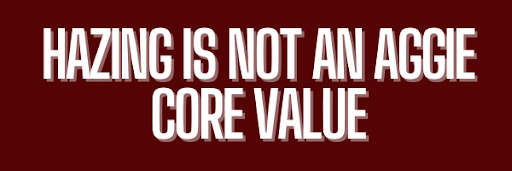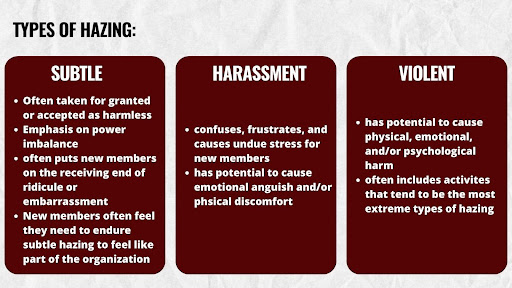-
24.4.5. Organization Affiliation Misconduct means any intentional, knowing, or reckless act, occurring on or off any campus of Texas A&M University, by one person alone or acting with others, directed against an individual for the purpose of pledging, being initiated into, affiliating with, holding office in, or maintaining membership in an organization; or as part of any activity of a recognized student organization, student group, Corps of Cadets, Corps outfit, Corps unit, Corps Special Activities, or Athletics that meets the criteria of: 24.4.5.1. Hazing; and/or 24.4.5.2. Organization-Related Intimidation and/or Abuse.
A student is responsible for Organization Affiliation Misconduct if the student:
- engages in Organization Affiliation Misconduct;
- solicits, encourages, directs, aids, or attempts to aid another in engaging in Organization Affiliation Misconduct;
- recklessly permits Organization Affiliation Misconduct to occur; or
- has firsthand knowledge of the planning of a specific Organization Affiliation Misconduct incident involving a student or has firsthand knowledge that a specific Organization Affiliation misconduct incident has occurred and knowingly fails to report that knowledge to the vice President for Student Affairs or other appropriate official off the institutions, a peace officer, or a law enforcement agency.
There are two types of Organization Affiliation Misconduct, based on the conduct and potential resulting harm:
- 24.4.5.1 Hazing is Organization Affiliation Misconduct that includes any intentional, knowing, or reckless act, occurring on or off campus, by one person alone or acting with others, directed against a student for the purpose of pledging, being initiated into, affiliating with, holding office in, or maintaining membership in an organization if the act:
-
24.4.5.1.1 is any type of physical brutality, such as whipping, beating, striking, branding, electronic shocking, placing of a harmful substance on the body, or similar activity;
-
24.4.5.1.2 involves sleep deprivation, exposure to the elements, confinement in a small space, calisthenics, or other similar activity that subjects the individual to an unreasonable risk of harm or that adversely affects the mental or physical health or safety of the individual;
-
24.4.5.1.3 involves consumption of a food, liquid, alcoholic beverage, liquor, drug, or other substance, other than as described by 24.4.5.1.5., that subjects the individual to an unreasonable risk of harm or that adversely affects the mental or physical health or safety of the individual;
-
24.4.5.1.4 is any activity that induces, causes, or requires the individual to perform a duty or task that involves a violation of the Penal Code; or
-
24.4.5.1.5 involves coercing, as defined below in this section, of the individual to consume:
(a) a drug; or
(b) an alcoholic beverage or liquor in an amount that would lead a reasonable person to believe that the individual is intoxicated.“Coercion” means a threat, however communicated, to commit a violation of a criminal law or university rule that implicates a criminal law; inflict bodily injury in the future on the person threatened or another; accuse a person of any criminal offense or violation of university rule; expose a person to hatred, contempt, or ridicule; harm the credit or professional repute of any person; or take or withhold action as a public servant, or to cause a public servant to take or withhold action.
-
Conduct constituting Hazing may also be a violation of Texas state law (see Tex. Educ. Code §37.151 and §51.936).
24.4.5.1.6 Personal Hazing Offense. A person commits an offense if the person:
- engages in hazing;
- solicits, encourages, directs, aids, or attempts to aid another in engaging in hazing;
- recklessly permits hazing to occur;
- or has firsthand knowledge of the planning or a specific hazing incident involving a student or has firsthand knowledge that a specific hazing incident has occurred, and knowingly fails to report that knowledge to the Vice President for Student Affairs or designee responsible for oversight of the student conduct processes and/or the University Police Department.
24.5.1.7 Organization Hazing Offense. An organization commits an offense if the organization condones or encourages hazing or if an officer or any combination of members, pledges, or alumni of the organization commits or assists in the commission of hazing.
24.4.5.1.8 Consent not a Defense. It is not a defense to being held responsible for hazing that the person against whom the hazing was directed consented to or acquiesced in the hazing activity.
24.4.5.2. Organization-Related Intimidation and/or Abuse is Organization Affiliation Misconduct that does not rise to the level of Hazing and includes, but is not limited to:
- 24.4.5.2.1 conduct that endangers the mental or physical health or safety of the individual
- 24.4.5.2.2. behavior that is severe and/or persistent to a degree that a reasonable person similarly situated would be prevented from accessing an educational opportunity or benefit. This behavior includes, but is not limited to, verbal abuse, deceit, threats, intimidation, and unreasonable requirements for new and continued membership of an organization;
- 24.4.5.2.3. confining a person or exposing participants to uncomfortable elements such as environments that are too hot, cold, noisy, small, or intimidating;
- 24.4.5.2.4. parading individuals in public areas, transporting individuals in a motor vehicle while wearing a visual obstruction, or privately conducting visually obstructed activities that serve no constructive purpose;
- 24.4.5.2.5. encouraging or requiring a person to publicly carry objects or wear apparel that is abnormal, not normally in good taste, conspicuous, and/or indecent;
- 24.4.5.2.6. destroying or removing public or private property;
- 24.4.5.2.7. any activity that induces, causes, or requires the individual to perform a duty or task that involves a violation of a university rule that does not implicate a criminal law;
- 24.4.5.2.8. soliciting, encouraging, directing, aiding, or attempting to aid another in engaging in intimidation or harassment; or
- 24.4.5.2.9. assisting, directing, or in any way causing others to participate in degrading behavior and/or behavior that causes ridicule, humiliation, or embarrassment.
- Customary public athletic events, contests, or competitions that are sponsored by the -University or the organized and supervised practices associated with such events; or
- Any activity or conduct that furthers the goals of a legitimate educational curriculum, a legitimate extracurricular program or a legitimate military training program as defined and approved by the University.



